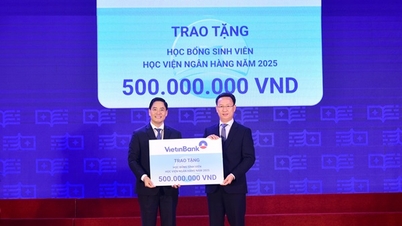
Digital space – Great opportunity but full of challenges
The boom of e-commerce is profoundly changing shopping habits, turning the digital space into the main "front" of retail. According to the Vietnam E-commerce Index Report 2025 of the Vietnam E-commerce Association (VECOM), in 2024, the scale of the online retail market will reach about 32 billion USD, of which online retail alone accounts for nearly 22.5 billion USD, an increase of over 25% compared to the previous year. VECOM's forecast shows that if maintaining an average growth rate of 18-20%/year, the scale of Vietnam's e-commerce can reach about 63 billion USD by 2030, rising to second place in Southeast Asia, just behind Indonesia.
This change means that Vietnamese consumers, especially the younger generation, increasingly "live" in the digital environment; traditional retail channels are under great competitive pressure. Online presence is no longer an advantage but has become a mandatory condition for businesses to survive and develop.
However, in the borderless digital space, Vietnamese businesses are facing fierce competition from international brands and imported goods. Without a clear and distinct positioning strategy, Vietnamese goods can easily be swept away among millions of products with just a mouse click.
According to economic experts, the biggest challenge for Vietnamese brands is building and protecting digital trust. "Fierce competition from international brands along with the problem of counterfeit, fake, and low-quality goods flooding e-commerce platforms are making it difficult for Vietnamese businesses to protect their brands and reputation," said economic and market expert Tran Manh Hung.
Recognizing this importance, state management agencies have taken the first steps to support Vietnamese enterprises in digital transformation and brand positioning, especially in strengthening quality control and promoting programs such as the Vietnam National Brand.
According to Ms. Le Hoang Oanh, Director of the Department of E-commerce and Digital Economy ( Ministry of Industry and Trade ), in the period of 2021-2023, through business support programs - including the Vietnam National Brand - the country has deployed more than 4,000 training courses on digital skills and e-commerce. This activity contributes to helping tens of thousands of small and medium-sized enterprises improve their management capacity, gradually participating in the online business ecosystem.
Data from major e-commerce platforms shows that the number of Vietnamese sellers increases by an average of over 35% per year, clearly reflecting the digital transformation trend that is spreading strongly in the private economic sector.

Regarding this issue, Mr. Bui Trung Nghia - Vice President of the Vietnam Federation of Commerce and Industry (VCCI) emphasized that brand positioning in the digital age is not just about logo design or promotion, but more importantly, building a seamless customer experience across all digital touchpoints. He also believes that it is necessary to perfect the legal framework and strengthen digital infrastructure to help businesses develop their brands, effectively control counterfeit goods, and protect the reputation of legitimate businesses.
Vietnamese brands need to transform their existing advantages into digital core values – elements that are difficult for competitors to copy. For example, a food brand needs to position its products transparently “from farm to table” by using traceability technology instead of just talking about quality with a few lines on the packaging.
Three pillars for Vietnamese products to conquer digital consumers
In order for Vietnamese products to not only be present but also truly conquer consumers in the digital market, there needs to be a synchronous strategy based on three main pillars: perfecting institutions, applying technology and building community trust.
Accordingly, Mr. Hung emphasized that in the digital space, data is "black gold". Vietnamese businesses need to invest heavily in data analysis tools to understand behavior, preferences as well as "pain points" - that is, problems, barriers or experiences that make customers uncomfortable during online shopping. Correctly identifying these points helps businesses improve products, services and retain consumers more effectively.
From a business perspective, Ms. Nguyen Thu Huong, Director of Thanh Huong Company Limited, a textile and garment enterprise in Hung Yen, shared: "Previously, we relied on intuition to design models, colors and predict trends. Now, all decisions are driven by data. Every month, we analyze tens of thousands of customer touchpoints on e-commerce platforms and social networks, from which we apply modern technology to suggest products according to individual needs and optimize advertising campaigns - thanks to that, business efficiency improves significantly and opens up many prospects."
This change in the business’s approach reflects the current consumer psychology: customers increasingly value personalized experiences. According to a report by the General Statistics Office (Ministry of Finance), up to 68% of Vietnamese consumers are willing to pay more for products and services with a high level of personalization. This confirms that a personalization strategy is the right direction to position the difference for Vietnamese brands.

To position a Vietnamese brand in the digital age is not just a single marketing campaign but a long-term revolution in thinking, technology and institutions.
Notably, according to economic experts, in the context of information saturation, Vietnamese brands need a "soul" to connect emotionally with consumers - that is the brand story. Dr. Nguyen Minh Phong believes that, to affirm their position in the market, Vietnamese brands need to focus on exploiting cultural depth, taking advantage of local raw materials and spreading stories about the spirit of overcoming difficulties and rising up. According to him, modern consumers do not only choose products because of their functionality, but also because of their desire to be connected with sustainable values and the community that the brand represents.
"The cultural story and community values will become the glue that binds Vietnamese brands with consumers. To strengthen that trust, it is necessary to promote the accompanying role of the whole society, encourage consumers to proactively detect and denounce counterfeit and fake goods and raise awareness about the consequences of consuming poor quality products. When consumers become 'true brand protectors', Vietnamese businesses will have an additional strong defense belt, contributing to preserving reputation and creating a sustainable position for Vietnamese brands in the digital space," Mr. Phong emphasized.
In addition, businesses need to upgrade their technology infrastructure and proactively cooperate with e-commerce platforms and large technology companies to apply digital solutions. This is the shortest way to quickly and sustainably access the market, while ensuring compliance with regulations on online consumer protection.
According to Mr. Phong, to successfully position Vietnamese brands in the digital age, a solid legal and technological foundation is needed. Authorities must strengthen control and strictly handle violations in the digital space, especially the problem of counterfeit goods, protect the intellectual property of Vietnamese enterprises; at the same time, apply technology to management, monitoring and fraud detection so that consumers can feel secure about the origin of Vietnamese goods.
It can be seen that positioning Vietnamese brands in the digital age is not just a single marketing campaign but a long-term revolution in thinking, technology and institutions. By taking advantage of Big Data, telling the brand story authentically, and receiving timely support from management agencies in building a solid legal corridor against counterfeit goods, Vietnamese goods can completely create a solid position, not only domestically but also on the global e-commerce map. With the support of State policies and efforts from businesses, Vietnamese brands can completely reach out to the world and affirm their position in the international market./.
Source: https://vtv.vn/hang-viet-tren-khong-gian-so-dinh-vi-de-but-pha-100251004173413748.htm







![[Photo] Super harvest moon shines brightly on Mid-Autumn Festival night around the world](https://vphoto.vietnam.vn/thumb/1200x675/vietnam/resource/IMAGE/2025/10/07/1759816565798_1759814567021-jpg.webp)



































































































Comment (0)